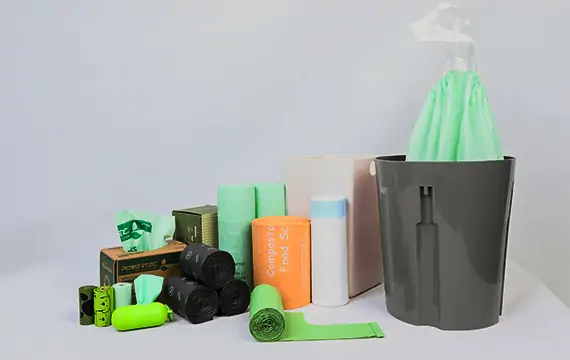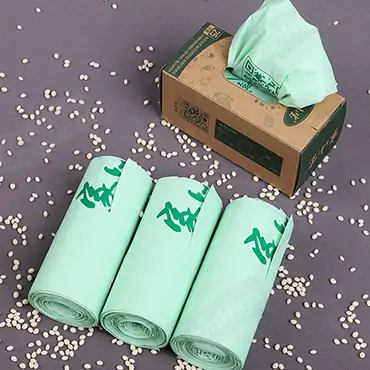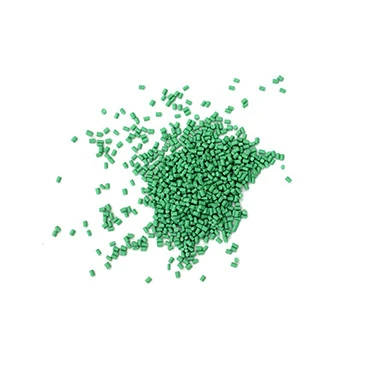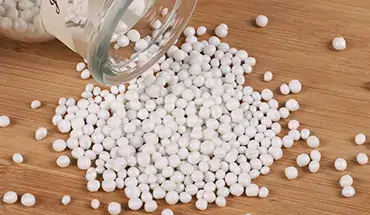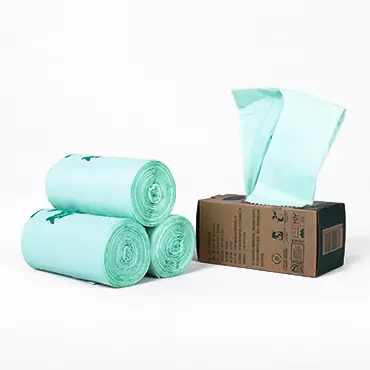The ubiquitous use of plastic trash bags across all business sectors presents a significant environmental challenge that demands our immediate attention. The volume of these bags consumed daily is substantial, and their disposal contributes to long-term waste management issues. Our experience as a manufacturer of compostable trash bags has provided us with direct insight into the negative consequences of plastic waste. This discussion will, therefore, focus on the urgent need for businesses to transition to more sustainable alternatives, specifically environmentally friendly trash bags.
Why Traditional Plastic Trash Bags are A Problem?
Although traditional plastic trash bags are widely used due to their convenience, their environmental impact is a serious concern. Their inability to decompose naturally results in persistent waste that occupies landfills for an inordinate amount of time. This timeframe extends beyond several decades to encompass thousands of years, highlighting the severity of the issue.
Landfill: They Just Won’t Go Away
Picture this: mountains of trash bags piled high in landfills, taking up valuable space and refusing to decompose. It’s like a stubborn guest who overstays their welcome – for centuries! These bags, made from petroleum-based plastics, just sit there, mocking our attempts at waste management. They become part of a landfill “lehenga” – a never-ending garment of plastic waste.
Toxic Cocktail: Leaching Chemicals and Their Impact
And that’s not all. As these bags slowly break down, they can leach harmful chemicals into the surrounding soil and water. Think of it as a toxic cocktail seeping into the environment, potentially contaminating our water sources and impacting ecosystems. These toxins can have adverse effects not only on the environment but potentially on our health, too. Nobody wants that, right?
Microplastics: The Tiny Terror in Our Ecosystems
To make matters worse, plastic bags often fragment into tiny pieces called microplastics. These insidious little particles are finding their way into our oceans, our food chain, and even the air we breathe. They’re like tiny terrors, wreaking havoc on marine life and potentially posing risks to human health. It is a big problem that starts with something as small as a trash bag.
Going Green: Exploring Eco-Friendly Trash Bag Options
So, what’s the alternative? Thankfully, the world of waste management is evolving. We’re moving beyond the “plastic is fantastic” era and embracing more sustainable solutions. Let’s take a look at some of the environmentally friendly trash bag options out there.
Degradable Trash Bags: A Step in the Right Direction?
Degradable trash bags are designed to break down faster than traditional plastic bags, often with the help of additives that react to light and heat. They sound good in theory. But here’s the catch: they often require specific conditions to degrade properly. In a landfill, buried under tons of other waste, those conditions might not exist. And even when they do break down, they can still leave behind microplastics. It’s like sweeping the dirt under the rug – it might look cleaner, but the problem is still there.
Biodegradable Trash Bags: Better, But Is It Enough?
Biodegradable trash bags take things a step further. They’re designed to be broken down by microorganisms into natural elements like water, carbon dioxide, and biomass. Sounds promising! However, “biodegradable” can be a bit of a vague term. Some biodegradable trash bags may still take a long time to decompose in certain environments, and some may require specific industrial composting facilities to break down completely. They can be better than traditional plastic or even degradable trash bags, but we need to be sure they’re truly living up to their name.
The Most Environmentally Friendly Trash Bags
Now, let’s talk about the real eco-hero of the trash bag world: compostable trash bags.
What Makes Compostable Trash Bags Different?
Compostable trash bags are made from plant-based materials, like corn starch or vegetable oils. Unlike their degradable and some biodegradable counterparts, they’re designed to break down completely in a composting environment, leaving behind no harmful residues. It is like nature’s way of hitting the reset button.
From Trash to Treasure: The Compostable Advantage
When you toss a compostable bag filled with organic waste into a compost bin or industrial composting facility, it transforms into nutrient-rich compost. This compost can then be used to fertilize gardens and crops, completing the cycle. It is a beautiful example of a circular economy – turning trash into treasure!
Certifications: Spotting Truly Compostable Bags
How can you be sure a bag is truly compostable? Look for certifications from reputable organizations like the Biodegradable Products Institute (BPI) in North America, TUV Austria (OK Compost, OK Compost HOME), or similar certifications in your region. These certifications guarantee that the bags meet strict standards for compostability.
Why Should Your Business Care About Compostable Trash Bags?
As a business, you might be wondering, “Why should I make the switch to compostable trash bags? What’s in it for me?” Let me tell you, there are plenty of compelling reasons:
-
Meeting the Demand for Sustainable Solutions
Consumers are becoming increasingly eco-conscious. They’re actively seeking out businesses that share their values and offer sustainable products. By offering compostable bin bags, you’re demonstrating your commitment to the environment and meeting the growing demand for eco-friendly solutions.
-
Boosting Your Brand Image
Let’s face it: green is the new black. Sustainability is no longer a niche trend; it’s a mainstream movement. Using compostable garbage bags can significantly boost your brand image, positioning you as a responsible and forward-thinking business. It is a great way to attract environmentally conscious customers and partners.
-
Potential Cost Savings in the Long Run
While compostable bags might have a slightly higher upfront cost, they can lead to potential cost savings in the long run. For example, if your business generates a lot of organic waste, using compostable trash bags and composting that waste can reduce your landfill fees. Some municipalities even offer incentives for businesses that compost.
Making the Switch: Practical Considerations for Businesses
Ready to make the switch to compostable trash bags? Awesome! Here are a few things to keep in mind:
-
Sourcing Reputable Suppliers
Not all compostable trash bags are created equal. Do your research and find a reputable supplier that offers certified compostable bags that meet your specific needs. Take a look at ShinHigh Bio, a manufacturer of compostable bags for over 20 years, offering a wide range of customized product categories to cater to our customer’s needs. Consult us now for your custom solution.
-
Educating Your Team and Customers
Make sure your team understands the benefits of compostable trash bags and how to properly dispose of them. If you’re offering them to your customers, provide clear instructions on composting.
-
Matching Bag Type to Your Waste Stream
Different types of compostable bags are designed for different types of waste. Make sure you choose the right bag for your specific needs, whether it is food scraps, yard waste, or other compostable materials.
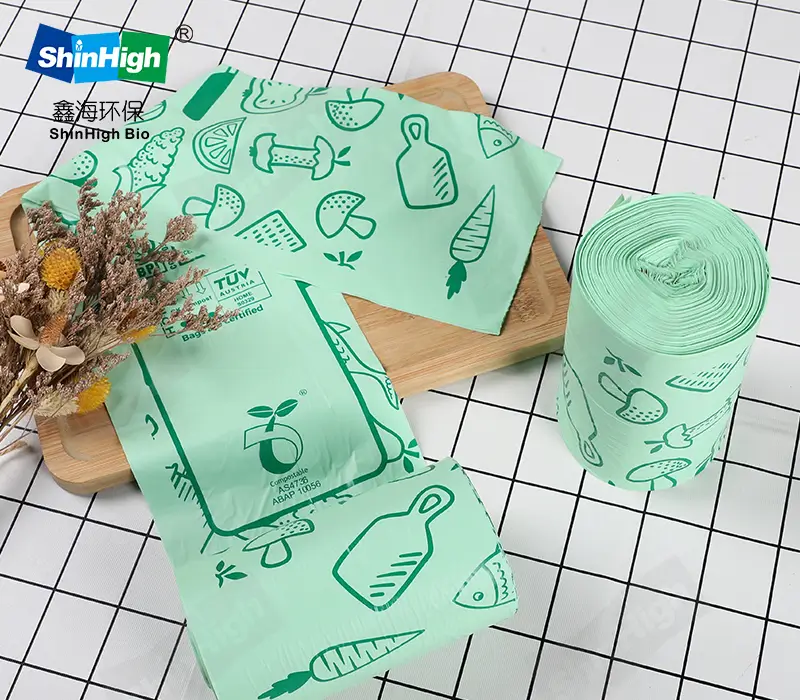
The Future is Green: Embracing Compostable Solutions
The future of waste management is green, and compostable trash bags are playing a key role in that transformation. By embracing these innovative solutions, businesses can reduce their environmental impact, enhance their brand image, and contribute to a more sustainable future.
FAQs
1. Are compostable bags really better than biodegradable bags?
Generally, yes. While biodegradable bags can break down, it may take a very long time. Compostable bags, certified by recognized organizations, are guaranteed to break down within a specific timeframe in a composting environment.
2. Can I compost compostable trash bags in my backyard compost bin?
It depends. Some compostable trash bags are certified for home composting (look for the “OK Compost HOME” certification), while others require the higher temperatures of industrial composting facilities.
3. What happens if a compostable bag ends up in a landfill?
While it will eventually break down, it won’t have the same beneficial impact as if it were composted. In a landfill, it might contribute to methane production, a potent greenhouse gas. Composting is always the preferred end-of-life scenario for compostable trash bags.
Conclusion
Switching to environmentally friendly trash bags, especially compostable trash bags, is a smart move for any business that wants to be part of the solution, not the problem. It is a simple change that can make a big difference. Let’s work together to create a cleaner, greener future – one compostable bag at a time!

